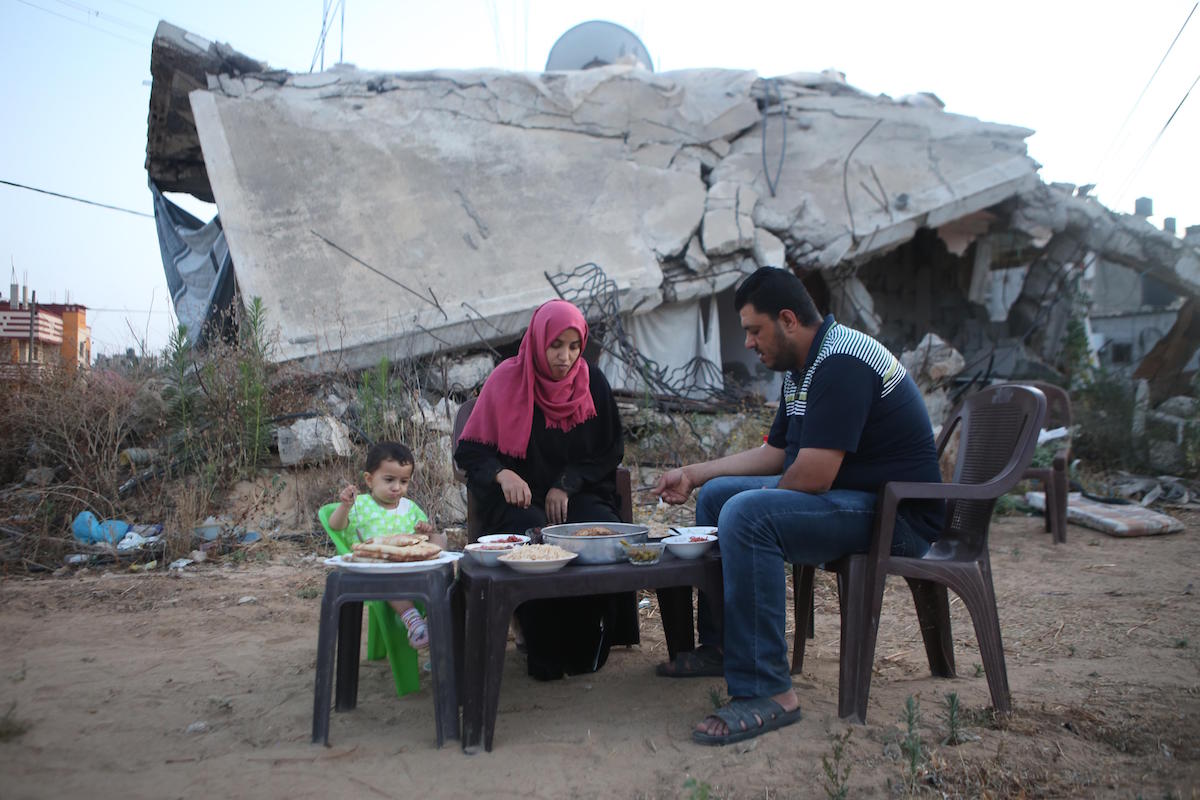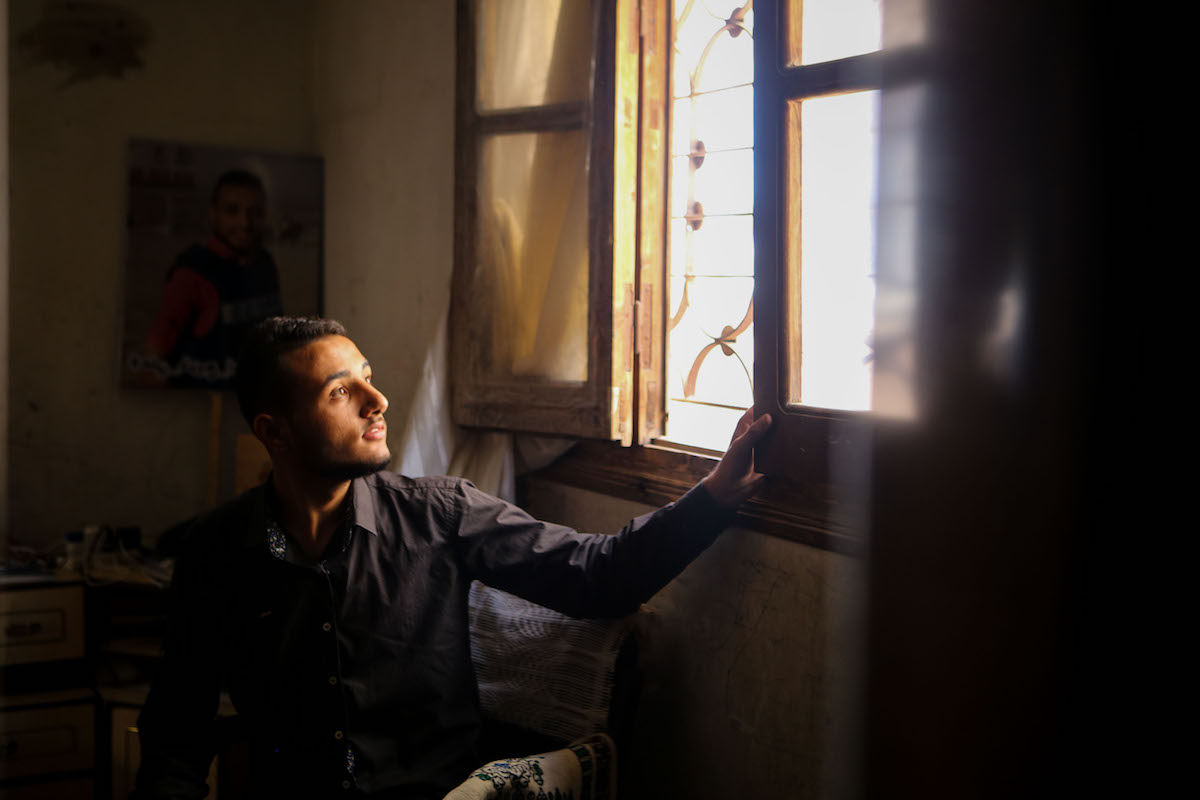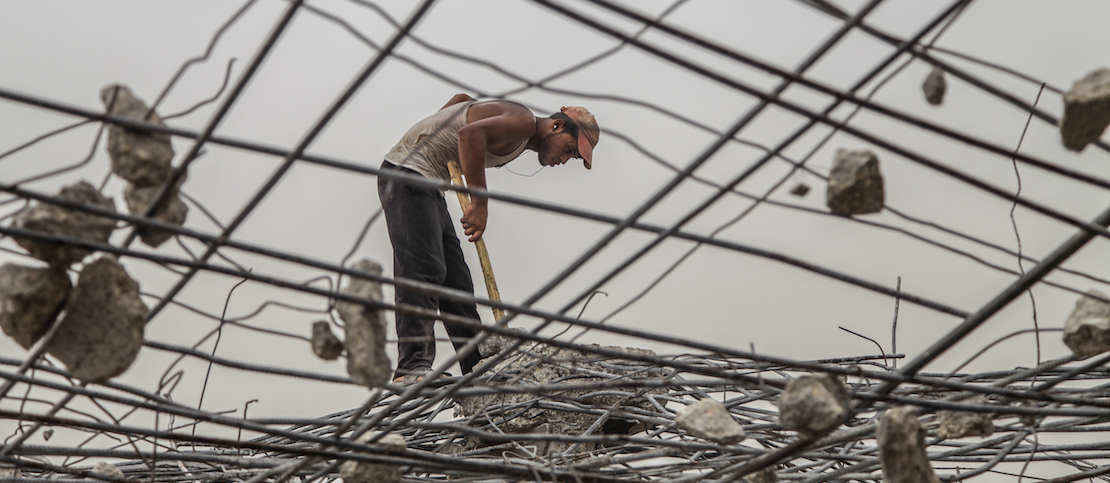By Amjad Yaghi
GAZA CITY – In the village of Abasan in the southern Gaza Strip, Hussein Shaheen’s family still lives in rubble. Their house was destroyed during Israel’s 2014 war on Gaza, and they haven’t rebuilt it since.
Since Gazans started the Great Return March several months ago, Israel has been retaliating with force, and tensions are high once again. Israel and Hamas are reportedly in the advanced stages of negotiating a ceasefire, but the constant uncertainty of whether the situation will change for better or worse, of whether Gazans should prepare for easements or escalation, induces severe anxiety. The 2014 military offensive and its consequences still haunt the residents of Gaza, and to them, the possibility of another war triggers painful memories.
Shaheen, 38, lives with his wife, Samaher Abu Jamea, 33, and toddler daughter, Salma, in tents they set up amid the rubble. After the war, they approached the Palestinian Ministry of Public Works and Housing in Gaza for assistance in reconstructing their house, without success.
“For four years, we have been living and eating in the rubble.” Jamea said. “We have gone many times to the ministry to demand that they accelerate the construction of our house, but unfortunately, many obstacles stand in their way,” she added, referring to Israel’s restrictions on the entry of construction materials into Gaza.

Since the 2014 war, Israel has suspended imports of building materials several times, which has created a backlog in the reconstruction of housing projects. The restrictions imposed by Israel vary from closing the Kerem Shalom crossing into Gaza, to barring materials like cement and piping, reducing the number of trucks that can cross carrying materials, and even cutting electricity, fuel, and water supplies.
By July 2018, nine thousand of 11,000 housing units that were totally destroyed in the last war were rebuilt, and half of the 160,000 units that incurred partial damaged were repaired, according to Undersecretary of the Ministry of Public Works and Housing in Gaza, Naji Sarhan.
The political situation has affected donors, who know that due to the closures it is difficult to send the most basic construction materials. Many international pledges for reconstruction funds have not been met, Sarhan said. As of last month, only 40 percent of the $4 billion that was pledged to rebuild has actually been provided, he added.
“The Gazan community does not want a war, but it is the victim of a suffocating Israeli blockade that has recently intensified,” Sarhan said.
That intensity is accompanied by feelings of despair. When people are promised access to rehabilitation and better living conditions over and over but those promises are not delivered, they lose hope. When four years go by and living conditions remain unchanged, that hope becomes harder to hold on to.
The people of Gaza are not only struggling to rebuild their houses, but also their lives. Gaza’s Shuja’iyya neighborhood was one of the areas to suffer the most damage and fatalities; 507 people were killed and thousands were injured there in the 2014 war, according to the United Nations.
That summer, Moeen Hilles escaped the bombing of the Shuja’iyya neighborhood with his family of six, and sought shelter in one of the UNRWA schools in coastal Al-Remal. His daughters, Aya, eight, and Maryam, 11, received psychological treatment for the trauma they experienced, but even today, when they hear shelling, it takes them back to that war.
“I stand helpless in front of their screams,” said Hilles.
“Aya was four years old, but she doesn’t forget the fear and terror she suffered from the Israeli war,” he continued. “Maryam could hear airplanes and tanks, and this is terrifying for children. They do not want war. They wait to grow up and live life as they see on cartoons.”
With the prospect of another war brewing, post-traumatic anxiety has intensified among Gazans, according to Fadel Ashour, a professor of psychiatry at the Faculty of Medicine at Al-Azhar University. He said the trauma has built up over generations, and hundreds of patients have been visiting his clinic in recent months.
“Sounds of reconnaissance aircraft as well as the spread of bad news create a state of instability. They activate the symptoms of the previous shock and fear of recurrence,” said Ashour.

Ali Akram Abu Shanab, 21, from Shuja’iyya, saw his grandmother and uncle die in the 2014 war.
“We were in the family house with 17 people, most of them children, and my father decided to send us out in three groups, so that we could leave with the least human damage. When we left, the shelling increased,” Abu Shanab recalls.
As he was escaping the bombing with his younger sister, he witnessed a house collapse and crush his grandmother and uncle.
“I was shocked but continued to run away from the building and the bodies of my grandmother and uncle until I reached an ambulance, which took me to Shifa Hospital,” he recalled.
Abu Shanab had difficulty completing his secondary education due to his PTSD but in July, he graduated with excellence from the University College of Applied Science.
For people like Abu Shanab, who have found ways to persevere despite the trauma, the possibility of another war means potentially losing everything they’ve accomplished since.
“I do not deny the fear of war while we haven’t recovered from the memories of the past war, and our home and the homes of many need reconstruction,” he said.

